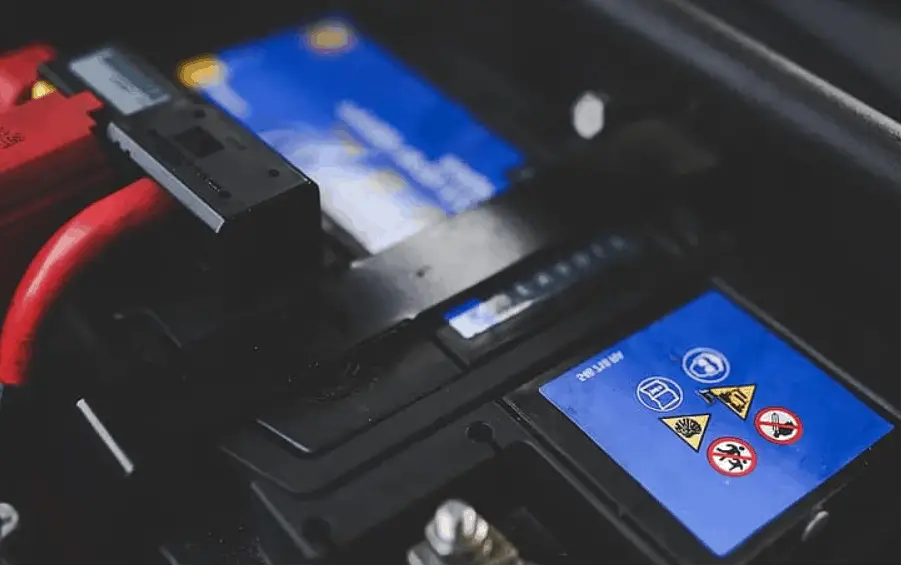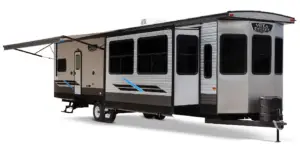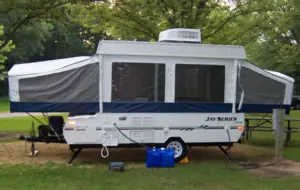In this article, we will see different type of battery options for RV. An RV battery is what powers the electrical components within your coach. Be it the vent fan, refrigerator, HVAC system, or anything electric within your RV.
Coming back to the question, What type of battery is needed to power your RV? To understand this, we will first understand the electric systems and what types of batteries can power your RV.
The RV and its internal equipped appliances determine what kind of battery you will need for your RV. Your style and usage are other factors that will decide on battery power.
RV Battery System
Your RV battery system comprises two types: 12V DC and a 120V AC system. Along with these two systems, there’s a regular battery for driving your coach. This is same as in a regular vehicle.
Among all 120 V battery system is the most powerful battery system that runs your coach appliances such as AC, fridge, or anything with a powerful motor.
Read : Basics of RV electrical system
A generator is needed to charge such a powerful battery. This is because it cannot be charged through a solar system. It gets charged in your coach when the generator is running while driving.
Smaller battery powers electric components such as fans, water systems, and interior lights. These can be charged without a generator. Even solar panels can be used to charge them. Here is your detailed guide on charging RV batteries with solar. There’s lot that people misunderstand and don’t know about, check it out.
RV Engine battery should have larger Cold Cranking Amps- CCA rating. These batteries supply 12 V and are called house batteries.
They are house batteries that are deep cycled, which imply that they are totally discharged and then recharged. This is why they last four times longer as compared to regular start-up batteries.
Different Types Of Batteries for RV
Different batteries can power your RV. Lets see some of the common types of batteries that are used in RVs or travel trailers.
Read : 14 Basic things you should know about RV Battery
Deep Cycle Batteries
Deep cycle batteries are lead-acid batteries similar to car batteries and have the same chemistry to power up.
A small variation is that deep cycle batteries generate a steady current for a long time, while a car battery powers current for a short time. This is because they charge during driving.
A marine battery is fine for simple camping. However, if you go boondocking, a battery type of larger capacity will be needed. This is where other battery types like deep cycle batteries will come into the picture.
Deep cycled batteries are subdivided into Below
- Flooded wet-cell batteries
- AGM- Absorbed glass mat batteries
- Gel-type batteries
Of the above three types, AGM- Absorbed glass mat batteries are ideal for RV.
AGM Absorbent Glass Mat
This is a spill-proof battery with a fiberglass mat that absorbs the sulphuric acid of the battery. It became very popular as it is not hazardous to use and transport.
As the fiber glass mat shields the sulphuric acid, there is no harm done. It has internal resistance that is low and hence very capable in high current delivery. It is long-lasting and maintenance-free.
These batteries are not so prone to sulfation and thus can be stored for long periods before charging. They sustain low temperatures. They also offer lower self-discharge. AGM batteries charge real quick, which is about five times faster than a flooded battery type.
These type of batteries can be deep cycled to about 80 percent. Hence, they last longer too. They are also less pricey as compared to gel batteries.
Some primary benefits of AGM batteries are listed as below:
- They make good starting batteries
- Operate even in cold conditions
- Spill-proof and hence offers good storage
- Matting technology acid encapsulation
- High power and lower internal resistance
- Flooded technology offers to charge five times faster
- Better service life
- Water retention
- Vibration resistant
- Less sulfation prone
- Lesser lead and electrolyte
Lets seem of the AGM batteries and their features. You can check these on amazon for more details.
VMAX V6-225: 6.2kWh 24V AGM Solar Battery
Features:
- High in performance
- Sealed, safe and maintenance-free
- Heavy-duty VMAX batteries
- Long service life
VMAXTANKS 6 Volt 225Ah AGM Battery
Features:
- Heavy duty
- Service span of 8-10 hours
- No contaminants or silica gels
- High in porosity with high electrolyte absorption
- Grids of heavy-duty
- Maintenance-free
Flooded Lead-acid Batteries
These types of batteries are common and are available in two types.
- Serviceable batteries with removable caps that aid in inspection
- Maintenance-free or perform maintenance type of batteries
GEL Cell Batteries
These batteries make use of acid that is in gel form. This is why they are leak proof. These batteries are not advantageous for RV.
They are particularly used for marine applications. This is because these batteries charge at a slower pace and offer low voltage as compared to flood cell batteries.
Too much of charging can result in damage to the battery cells permanently. Therefore, they cannot be used for heavy duty operations. These can be used for beginners when driving an RV with reasonable load.
These Points Can Be Summarized As:
- Marine batteries or gel type batteries have two years lifespan in maximum and are cheaper in price.
- Deep cycled AGM batteries are expensive than the others and has a lifespan of 4-10 years.
- Flooded cell or golf cart batteries last for 6-7 years of life.
AGM batteries are perfect and suitable for RV as they suit its features, functions, lifespan, and affordability.
Lithium Batteries
Lithium batteries are an alternative option for deep cycled batteries. They are used by people who are looking to upgrade the solar power systems.
These have some advantages over other battery types. They are light in weight, easy to maintain, and smaller in size than other types of batteries.
They last long to about 5k cycles, which is more than the lead-acid type of batteries. However, they are expensive than other batteries.
If you are looking for upgrading your RV system to the solar energy system, Lithium-ion battery type is preferred. Although it can be expensive at the beginning, it is worth the purchase. This is because it lasts longer and is highly capable. Here is a list of top lithium batteries for RV.
Some primary benefits of a lithium battery are listed as below.
- It is an efficient powerhouse.
- Higher efficiency in charging of about 15 percent.
- It is lighter than the AGM battery to about 50 percent.
- They have a deeper discharge depth and so last longer than other battery types.
Check out our pick in this category. Battle Born LiFePO4 Deep Cycle Battery
Features
- 12 V and 100 Ah
- In-built Battery Management System-BMS-regulates the power intakes cut off in unsafe conditions and other common failures
- Lithium-ion technology- longevity, high mounting capacity, good security with protection against power faults
- 100 percent non-toxic, safe and green energy batteries
- Lasts for more cycles
- Versatile and light in weight
- Perfect for RV
Battery Accessories For RV
Battery Monitors For RV : A battery monitor lets you keep track the charger state – on or off and track the power flow in and out of the battery. Testing and monitoring the rv batteries is much critical as otherwise you will have dead batteries pretty soon than expected. There are 3 common method to test the RV batteries. Check out the best Battery Monitor for RV on amazon.
Battery Charging For RV : Batteries charge with an electric power outlet. An RV charger or converter transforms the power into 12V DC from the grid and directs it to the adapter that fits in your RV. Check out Progressive Dynamics PD9160ALV 12V Lithium Ion Battery Converter/Charge on amazon.
Check Out The Other Accessories Below
Multi-stage Chargers : Powermax 110 Volt to 12 Volt DC Power Supply Converter Charger for RV on amazon
Battery Terminals : A-Team Performance 1/0 AWG American Wire Gauge Battery Cable 3/8″ on amazon
What Is The Cost Of An RV Battery
The battery cost differs on the type of battery you purchase for your RV. From the different types of batteries for RV, as mentioned above, each battery type offers different functionalities.
A regular lead-acid type of battery can cost you some hundred dollars, whereas lithium battery type can price you some thousands. However, the initial cost of a lithium battery may appear expensive, but it is cost-effective in the long run.
So, it’s totally on what type of battery and what functionality you are looking for in a battery that decides the cost of an RV battery.
What Is The Lifespan Of RV Batteries
The lifespan of RV battery is on how much you make use of it and how well you maintain it. Depending on the battery type, the lifespan varies. A deep cycle battery offers 400-500 charge cycles maximum while a Lithium-ion type of battery lasts around 5k charge cycles maximum.
Read : RV battery wont charge, what to do?
On an average RV batteries have a lifespan of 4-5 years. But, as we discussed it will vary a lot depending on the type of battery you get.
Apart from the type of battery, how you use and maintain it has a lot of effect on how long they stay put. In most cases the batteries start to hold less charge and eventually they are no longer good for use.
Charge
This happens when the batteries are allowed to discharge below 40% charge very a long period of time. Good practice is to keep the charged as high as possible. Make sure the batteries are charged fully before using.
Trickle charge is a great way of keeping them charged. Make sure water level is maintained as per recommendations. We use solar panels to charge our batteries, this keep them charged for the nights.
How Many Batteries Can An RV Accommodate For Use
It is better to go for two batteries at first. Later you can upgrade it to four batteries. However, four batteries do add to RV weight overall. So, use them only if needed. These batteries are linked in series to form an overall 12 V battery. Each cell can be from 2V to 6 V.
A lot will also depend on where you will be camping. If you are going to be at a campground then you wont need much battery power. Shore power will provide for the power to run the appliances.
Boondocking, battery and generator
But, if you are boondocking then battery will be your main source apart from generator.
RV generators are heavy and if you own a small RV or if you are not seasonal Rver then generator may not be for you. They also make noise and if you cannot tolerate it then having better battery system is the best option.
Solar panels cannot be used directly to provide power, they store the power in batteries which is to be used. Many people have this misconception that solar can directly provide the power but that is not the case.
How To Maintain RV Batteries
RV batteries lifespan is dependent on how deep the cycling of battery is done every time. One cycle means a total discharge from 100% to 50% and then recharged to 100%.
The life span of a battery depends on how soon the recharging of the battery is done after discharge. The sooner the charging of the battery would be, the better it would be to keep it running. These batteries last based on your usage amounts and the cycles of charging.
Storing the Batteries during winter
RV batteries need to be protected specially during winter storage. If you are storing the RV make sure the batteries are stored separately.
The main reason why this should be done is to avoid discharging of batteries due to parasitic loads. Some of the new batteries system have inbuilt cut off switch, this will avoid the parasitic loads. Many RVers neglect the battery storage and that’s exactly what leads to reduced battery life. Check out my complete detailed take on storing the RV battery in right manner.
If you don’t do this then unknowingly you will subjecting the batteries to such unnoticed loads like carbon monoxide detector or other lights. Many a times these loads will cause the battery charge to come down.
In Conclusion
Whatever battery type you may be using for your RV, its maintenance and usage amount will decide how long it will last. From above, it is clear that AGM battery types and Lithium-ion battery types are perfect for your RV. Make your RVing the best of its experience by choosing the right and efficient battery for your RV.





